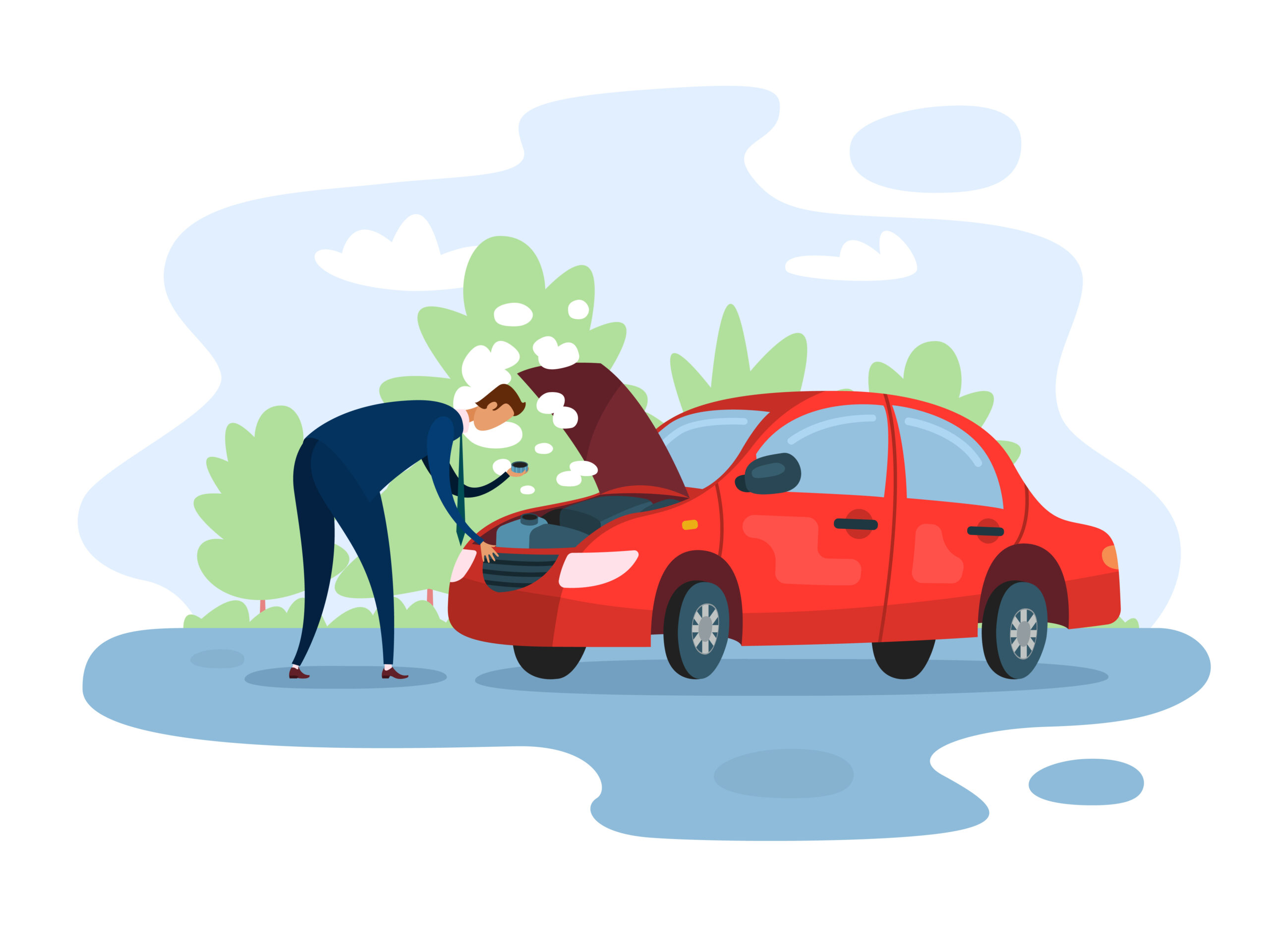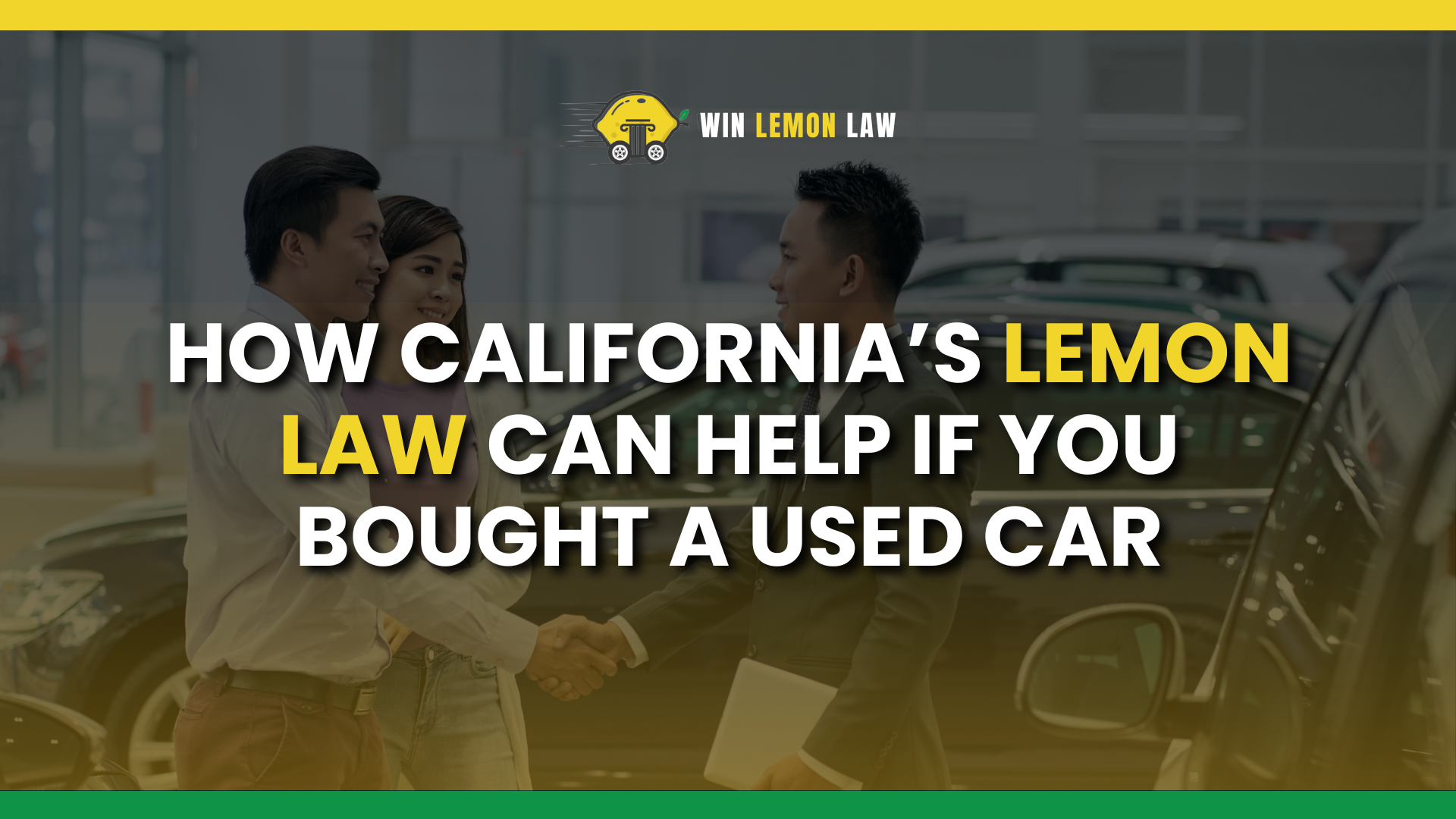Purchasing a car, whether new or used, is a significant financial investment. It’s natural to expect that the vehicle you drive will be reliable, comfortable, and serve you well for years to come. But what if, after purchasing your used car, you find yourself dealing with persistent issues that just won’t seem to go away, no matter how many times you’ve taken it in for repairs? If you live in California, there is good news for you: California’s Lemon Law can offer you protection, even if you bought a used car.
We specialize in helping consumers understand their rights under the state’s Lemon Law, and we’re here to explain how it works and how it may apply to your situation.
What is California’s Lemon Law?

California’s Lemon Law is designed to protect consumers who purchase or lease vehicles that have serious defects or problems that significantly impair their use, safety, or value. Under the law, if your vehicle has defects that can’t be fixed after a reasonable number of repair attempts, you may be entitled to a refund or replacement. While the law is most commonly associated with new cars, it also applies to used cars in certain circumstances. This means that if you purchased a used car and it develops issues that cannot be resolved, you may still be eligible for compensation or a replacement under California’s Lemon Law.
The Basics of California’s Lemon Law for Used Cars
Many used car buyers assume that the Lemon Law only protects those who purchase brand-new vehicles, but that’s not the case. While it’s true that the law is often applied to new cars, it also provides protections for used cars, as long as certain conditions are met. These conditions are based on the vehicle’s warranty, the nature of the defects, and how many times the car has been repaired for those defects.
Under the Lemon Law, if a used car is still under the manufacturer’s original warranty, it can qualify for protection, even if you are not the original owner. This means that if the car’s manufacturer warranty is still active, any significant defects that arise during the warranty period can trigger Lemon Law protections, regardless of whether the car is new or used.
In addition to manufacturer warranties, if the car is sold with a dealer warranty or service contract, those protections can also be applicable under the Lemon Law.
Understanding Manufacturer Warranties: What You Need to Know
When you buy a new car, it typically comes with a warranty from the manufacturer. These warranties are designed to protect consumers from defects in materials or workmanship that may arise over time. While these warranties are most commonly associated with new vehicles, they can still apply to used cars, especially if the vehicle was sold relatively recently.
- Bumper-to-Bumper Warranty
The bumper-to-bumper warranty is the standard warranty that comes with most new cars. It typically covers repairs for a wide range of components, including electrical systems, air conditioning, steering, suspension, and other parts that are essential to the overall operation of the car. This warranty is usually in effect for three years or 36,000 miles, whichever comes first, although the exact terms may vary by manufacturer.
If you buy a used car that’s still within the bumper-to-bumper warranty period, you may be able to take advantage of this coverage to have your car repaired, replaced, or refunded, depending on the nature of the defect. It doesn’t matter if you are the original owner of the vehicle or not—the warranty will still apply as long as the vehicle is within the warranty period and the defect is covered under the terms of the warranty.

- Powertrain Warranty
In addition to the bumper-to-bumper warranty, most new cars come with a powertrain warranty. This warranty typically lasts longer than the bumper-to-bumper warranty, often extending to five years or 60,000 miles, or even up to ten years or 100,000 miles, depending on the manufacturer. The powertrain warranty covers the essential mechanical components of the car that are necessary for the car to move, such as the engine, transmission, drivetrain, and other vital systems.
If you buy a used car that is still covered under the powertrain warranty, you may be able to utilize this protection for defects related to these key systems. For example, if your used car starts having transmission problems or the engine begins to fail, you may still be covered under the original warranty, even if you are not the original owner.
What Happens If the Manufacturer’s Warranty Has Expired?
If you purchase a used car and the original manufacturer’s warranty has expired, you may feel like you have no recourse if defects arise. However, there are still options available for you. Many used car dealerships offer their own warranties or service contracts, which may provide some coverage if defects arise after the purchase.
- Dealer Warranties
In California, many used car dealerships provide their own warranties to consumers who purchase used vehicles. These warranties can vary widely, but they typically cover specific components of the car for a set period, such as 30 days or 1,000 miles. Some dealerships may offer more extensive warranties that cover a broader range of issues for a longer period, such as 90 days, 6 months, or even a year.
If your used car develops issues during the dealer warranty period, the Lemon Law may still apply. The dealer may be required to repair, replace, or buy back the car if the problems are substantial and persistent. This is particularly true if the dealer fails to address the issue after a reasonable number of repair attempts.
- Implied Warranties of Merchantability
In some cases, even if the dealer does not provide an explicit warranty, the law may still protect you. Under California’s implied warranty laws, all cars sold by dealers must meet certain standards of quality and functionality. This is known as the implied warranty of merchantability, and it applies regardless of whether the vehicle comes with a written warranty. If your used car fails to meet these basic standards—such as having major defects that impair its usability or safety—you may still have grounds for a Lemon Law claim.

The Importance of Documentation and Repair Records
To successfully pursue a Lemon Law claim, it is important to keep thorough documentation of any defects or issues that arise with your used car. This includes repair records, invoices, and correspondence with the dealer or manufacturer. If you take the car to the shop for repairs, make sure that the problem is clearly documented, and keep a record of how many repair attempts have been made.
The more evidence you have, the stronger your case will be if you need to take legal action. It’s also helpful to keep track of any phone calls or emails you’ve had with the dealership or manufacturer, as these can serve as additional proof of your efforts to resolve the issue. Documenting all repair attempts and any communications with the dealer or manufacturer will be essential if you are pursuing a buyback or replacement.
Common Issues Covered Under California’s Lemon Law
Some common issues that often trigger Lemon Law claims include:
- Transmission Problems: If the transmission is slipping, failing to shift, or making strange noises, it can significantly impair the vehicle’s functionality.
- Engine Issues: Engine problems, such as stalling, misfiring, or excessive oil consumption, can lead to costly repairs and major inconvenience.
- Electrical Failures: Electrical system issues, such as problems with the battery, alternator, or wiring, can impact the car’s ability to start or function correctly.
- Suspension Defects: Suspension defects can lead to a rough ride, unsafe handling, or even make the car difficult to drive safely.
- Brake Failures: If the brakes are malfunctioning, they can pose a serious safety hazard. Brake-related issues are a major concern under Lemon Law.
If your used car is experiencing any of these or similar problems and you’ve made several unsuccessful attempts to repair them, you may be entitled to relief under California’s Lemon Law.
Closing
Just because you bought a used car doesn’t mean you are out of options if it starts having problems. California’s Lemon Law provides significant protections for used car buyers, even if the manufacturer’s warranty has expired or the dealer warranty is limited. Whether your vehicle is still covered by the manufacturer’s warranty or you are relying on a dealer warranty, there are avenues available for you to seek compensation, repairs, or even a replacement.
If your used car has persistent problems that are affecting its safety, reliability, or value, don’t hesitate to contact Win Lemon Law. Our dedicated team is here to help you navigate the complexities of the Lemon Law and fight for the justice you deserve. Call us for a free consultation today, and let us help you get the relief you need.

